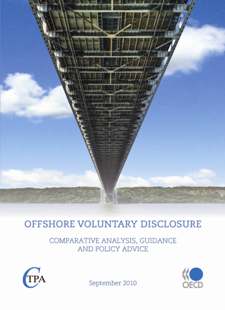Exchange of information
2010 OECD Study on Offshore Voluntary Disclosure
|
|
27/10/2010 - Vast amounts of tax are lost to offshore tax evasion every year. Governments have become increasingly aggressive in cracking down on offshore tax evasion and have new tools to tackle the problem. Now, with more than 600 tax information exchange agreements signed and double tax agreements amended, the risk of detection has increased dramatically. In this environment, governments are giving previously non-compliant taxpayers an opportunity to “come clean” through voluntary disclosure initiatives. For instance, more than 14 700 taxpayers participated in a recent initiative in the United States, and in Germany more than 20 000 taxpayers made a voluntary disclosure resulting in reported additional revenue in the range of €4 billion.
This publication shows how 39 countries (all OECD members as well as Argentina, China, India, Russia, and South Africa) deal with offshore tax evasion, comparing the case where a taxpayer has made a voluntary disclosure with the case where he has not: What penalties are imposed, what interest rate is charged, what tax is due, what is the risk of criminal prosecution and imprisonment? How does one country compare to other countries? How to design voluntary disclosure laws and programs? What do private client advisors see as some of the key design issues?
All these questions and more are addressed in the recently released OECD publication “Offshore Voluntary Disclosure: Comparative Analysis, Guidance and Policy Advice” [pdf].
For further information contact Achim Pross at achim.pross@oecd.org.
Related Documents
